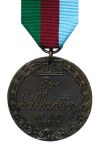Judy
Biography
Judy is born in Shangai in a Dog Kennel in 1937, and became almost immediatly a mascot of the Royal Navy. In 1942 she joined the crew of the gunboat HMS Grasshopper. At that time she already had notched-up a series of misadventures, such as falling overboard and almost drowning in the Yantze river.
She was a member of the Grasshopper’s crew, so she was very active during the Maylay-Singapore campaign. When the ship headed for Java, they were shot by an enemy aircaft. The survivors stranded with no water on an uninhabited island. Judy was rescued by clinging to the wrechage of the ship’s bridge, and she quickly rescued the crew by sniffing out a fresh water spring.
After that Judy and the crew began an 200 mile trek from the north-east coast of Sumatra to Padang. But they walked into a Japanese held village and were taken prisoner, including Judy. An officer found a way to hide Judy in a rice sack, and she remained quiet for five days.
She was lucky to meet Leading Aircraftsman Frank Williams. He felt sorry for the dog en dicided in August 1942 to adopt her.
From that moment she regarded Franks as her "boss" but still many of the prisoners owed their lives to Judy. Her spirit inspired prisoners. She knew when there was danger, and she distracted guards so that some men could escape a beating.
Judy hated the guards of the camp, and the guards didn’t like her neither. They even wanted to shoot her, but Frank talked them out of it, risking a beating himself. Frank even persuaded the camp Commandant to register Judy as a Prisoner of War, so she would be save.
In June 1944, the prisoners had to go aboard the merchant ship "SS Van Warwyck", but they weren’t aloud to take the dog with them. Still Fank took her with him in a rice sack on his back. And when they got on the ship she could savely sleep by William’s feet.
But she wasn’t save at all. Just a couple of days after the journey bega, the ship was torpedoed. Frank tried to get her save, but got sepperated from her. Witnesses told him the had seen Judy helping survivors by allowing them to cling on the her. She was in the water for hours. They were reunited when they entered a camp, three days after the accident.
When Judy returned to a prison camp in Sumatra, she was changed. She wasn’t a pet anymore, but her instinct was leading her.
She did constant attacks on the guards which resulted in her being condemned to death and fed to the prisoners. But she succesfully avoided ditection until liberation came in 1945.
After six months in quarantine kennels at Hackbridge in Surry, Judy emerged a national heroine. She was going to receive the PDSA’s Dickin Medal. In May 1946, Major Viscount Tarbat M.C., Chairman of the Returned British Prisoners of War Association, fastened the bronze medal to Judy’s collar at a special ceremony at the Association’s headquarters in London.
Do you have more information about this person? Inform us!
Action:
For magnificent courage and endurance in Japanese prison camps, which helped to maintain morale among her fellow prisoners and also for saving many lives through her intelligence and watchfulness."
Sources
- - PDSA
v


